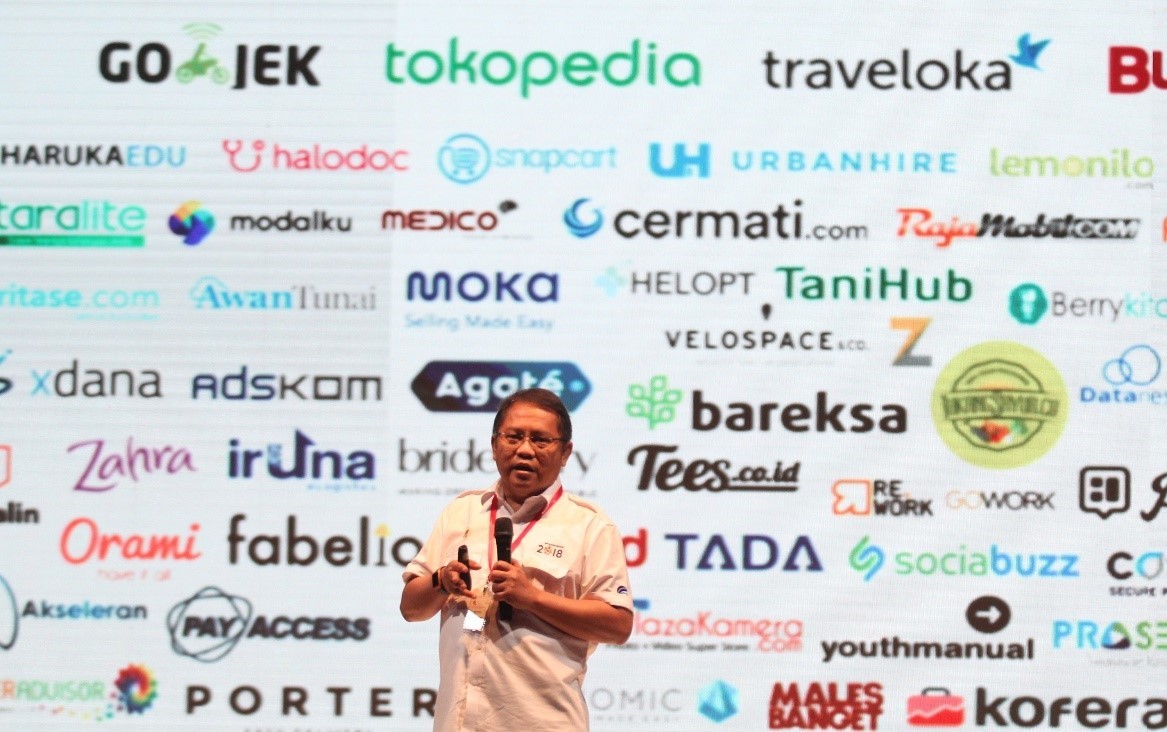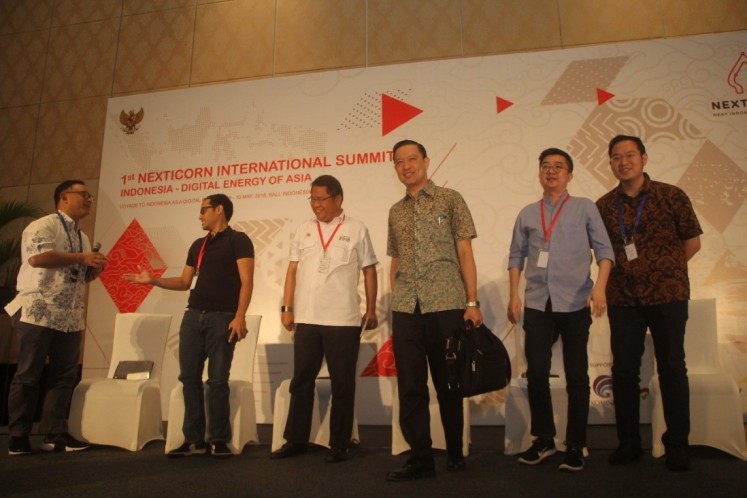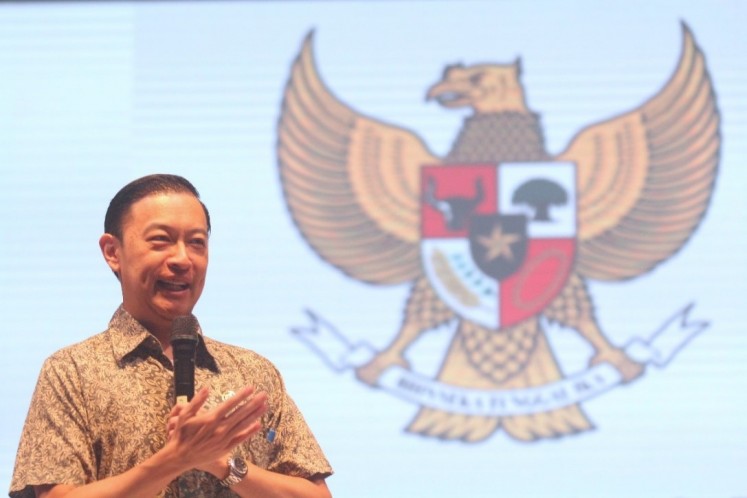Popular Reads
Top Results
Can't find what you're looking for?
View all search resultsPopular Reads
Top Results
Can't find what you're looking for?
View all search resultsRudiantara appoints four 'virtual ministers' during digital economy summit
It does not look like the typical conference. The Bali Nusa Dua Convention Center (BNDCC) ballroom looks like an informal venue for screening a film, with beanbags of different colors strewn across the floor to provide seating for hundreds of people – most of them youngsters in casual attire.
Change text size
Gift Premium Articles
to Anyone
 Cultivating unicorns: Communications and Information Minister Rudiantara delivers a speech on May 9 to open the inaugural Nexticorn International Summit Indonesia in Nusa Dua, Bali. The two-day summit will match Indonesian digital startups with local and foreign venture capitalists to boost the digital economy. (JP/Zul Trio Anggono)
Cultivating unicorns: Communications and Information Minister Rudiantara delivers a speech on May 9 to open the inaugural Nexticorn International Summit Indonesia in Nusa Dua, Bali. The two-day summit will match Indonesian digital startups with local and foreign venture capitalists to boost the digital economy. (JP/Zul Trio Anggono)
Sebastian Partogi
The Jakarta Post/Nusa Dua, Bali
It does not look like the typical conference. The Bali Nusa Dua Convention Center (BNDCC) ballroom looks like an informal venue for screening a film, with beanbags of different colors strewn across the floor to provide seating for hundreds of people – most of them youngsters in casual attire.
Despite the laid-back atmosphere, they are not there for leisure; they are there to participate in the inqugural Next Indonesian Unicorns (NextICorn) International Summit, organized by the Association of Venture Capitals for Indonesian Start-ups (Amvesindo) in cooperation with the Communications and Information Ministry. With the summit’s decor evoking Google headquarters in Palo Alto, California, it endeavors to help aspiring start-ups find their perfect venture capital match to take their businesses further.
The term “unicorn” has commonly been used as a metaphor for digital start-ups because, just like the mythical animal, start-ups are also considered magical entities that possess amazing capabilities. Indonesian digital start-ups are amazingly capable of solving problems while helping numerous people in becoming economically empowered.
The summit has selected four Indonesian unicorns: ride-hailing transportation company Go-jek, online retail platforms Bukalapak and Tokopedia, as well as travel booking platform Traveloka. Go-jek provides ease of access to transportation and logistics services, while Bukalapak helps small-to-medium enterprises find customers and buyers across the archipelago. The multiplier effects of the two businesses have been massive, helping many people earn a living.
‘Virtual ambassadors’: Communications and Information Minister Rudiantara (third left) and Investment Coordinating Board (BKPM) chairman Thomas Lembong (third right) pose for a photograph with (from left) Nexticorn ambassador Daniel Tamiwa, Go-Jek founder and CEO Nadiem Makari, Tokopedia founder and CEO William Tanuwijaya and Traveloka founder and CEO Ferry Unardi. The group of leading drivers of the digital economy appeared at a May 9 press conference for the 1st Nexticorn International Summit Indonesia in Nusa Dua, Bali. (JP/Zul Trio Anggono)The contributions the highly successful start-ups have made to the national economy and in solving practical issues for consumers has been such that Communications and Information Minister Rudiantara jokingly said during the summit’s opening, "If I were the virtual president of Indonesia, I would have appointed [Go-jek founder and chief executive officer] Nadiem Makarim as the virtual transport minister, [Traveloka co-founder and CEO] Ferry Unardi as the virtual tourism minister, [Bukalapak CEO] Achmad Zaky as the virtual small-to-medium enterprises and cooperatives minister and [Tokopedia co-founder and CEO] William Tanuwijaya as the virtual minister of trade and e-commerce."
The summit aims to boost the creation of the next great digital start-ups in the country, with the help of international investors, from May 9 to 10 at the BNDCC in Nusa Dua, Bali.
"NextICorn is a forward-looking program seeking to build a platform to connect local start-ups with the world's preeminent investors," said Venturra Capital managing partner Rudy Ramawy, who also helped manage the event.
To achieve this, the summit is bringing together 64 local start-ups and 67 foreign investors from the United States, China and India, to engage in bilateral meetings for local companies to obtain the capital they need. To date, 823 such meetings have been arranged during the two-day summit.
"I have frequently been asked by visiting investors from abroad: 'I have three days in Jakarta, which businesses should we meet [to explore potential cooperation]?' Likewise, we have also spent a lot of time trying to find the right partners for the right investors,” said Rudy. “[...] This summit is an efficient way to curate, connect and facilitate such engagements."
Looking forward: Investment Coordinating Board (BKPM) chairman Thomas Lembong delivers his keynote address on the opening day of the 1st Nexticorn International Summit Indonesia on May 9 in Nusa Dua, Bali. (JP/Zul Trio Anggono)According to Indonesia Investment Coordinating Board (BKPM) chairman Thomas Lembong, foreign investment in Indonesia over the last four years has been saved by two sectors: smelter construction, particularly of nickel, and the start-ups driving the digital economy. "Without digital economy and smelter construction, foreign direct investment in Indonesia would have definitely slowed down. This is why we have huge interest in what you are doing," Thomas addressed the summit's participants. "We have to expand capital inflow to e-commerce and the digital economy."
Thomas said foreign venture capitalists have constituted the majority of digital economy investors in Indonesia. This is understandable, because the capital venture sector was established in the United States 50 years ago and flourished in advanced countries like China and Japan before coming to developing countries like Indonesia. "We will find ways to involve more domestic investors to boost Indonesia's digital economy," he said.
Achmad said he was optimistic about the bright future of Indonesia's digital economy. "In 2008, in China's early stage of digital economy development, most people used personal computers to run their businesses there. Now in 2018, we are standing at a similar stage as China was in 2008 and yet, we have two advantages: the rapid adoption of smartphones and portable wireless internet connections," he said, adding that Indonesia would soon be in the same standing as China and India in its digital economy.
Meanwhile, Nadiem said that Indonesia was the quickest market to adopt new innovations, which could help boost the digital economy sector. Thomas added that to help the local digital economy grow further, the government was working hard in bureaucratic reform and simplifying business procedures.
Rudiantara said the government was supporting the digital economy by enhancing broadband connectivity through its ongoing Palapa Ring project, which aims to provide internet access across the archipelago. "The broadband network has been [online] in the Western part of Indonesia from March 2018. In central Indonesia, its construction has progressed by 77 percent, while in eastern Indonesia, construction has reached around 40 percent. We expect the new broadband network to be operational across Indonesian cities by the beginning of 2019," Rudiantara said.
Nadiem agreed with the government's plan to invite foreign lecturers and trainers to develop Indonesia's engineering talent, which was still a niche group, to provide the digital sector with the human capital it badly needed. "The apprenticeship program allows junior programmers to work with their seniors who already possess higher skill sets," he said.
Thomas added that inviting foreign lecturers and trainers to develop the skills of 1,000 youths in Indonesia was much more efficient than sending only a few people to study abroad. Yet, to realize that goal, a number of regulations on foreign workers needed to be revised to make it easier for lecturers and trainers to work in Indonesia, said Thomas.
Rudiantara said that foreign educators could also help set the local economy in motion and protect economic stability in contrast to sending people abroad to study, which would have a negative impact on Indonesia's foreign exchange rate.











